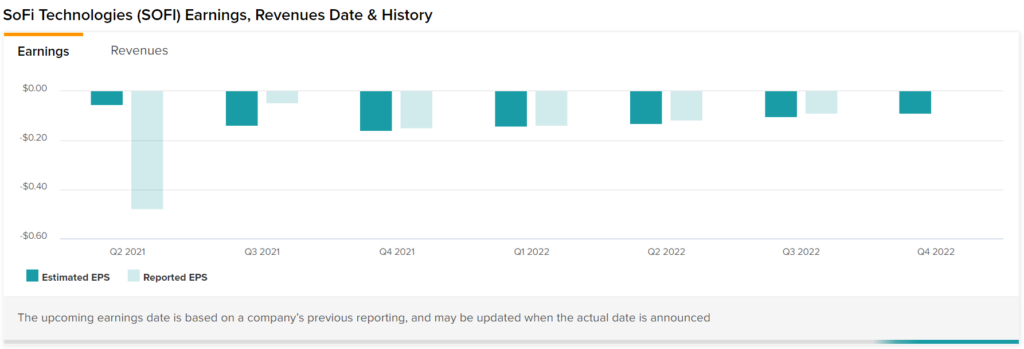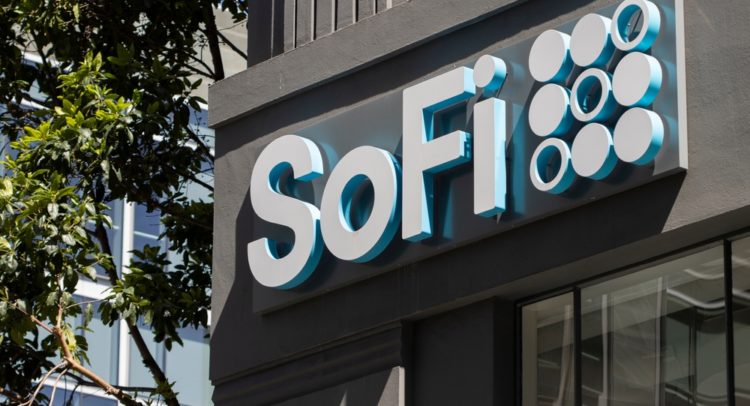On paper, the narrative undergirding financial technology (fintech) giant SoFi Technologies (NASDAQ:SOFI) appears exceptionally compelling. Fundamentally, modern consumers often prefer digital interactions over their analog counterparts. More to the point, the company recently delivered solid earnings results. However, deep in the fine print, concerns about consumer sentiment shifts materialized. Therefore, I am bearish on SOFI stock.
To be fair, the framework for the fintech specialist suggests optimism is in order. At the beginning of this month, SoFi revealed its results for the third quarter. According to TipRanks reporter Shrilekha Pethe, the loss per share came in at $0.09, which didn’t quite compare favorably against the loss of $0.05 in the year-ago quarter. Nevertheless, this beat the estimate of a $0.11 loss.

On the revenue front, SoFi generated $419.3 million on the top line. Here, the figure blew past Q3 2021’s result by a robust margin of 51%. In addition, it beat Wall Street’s consensus sales target of $391.8 million.
Bolstering the fundamental case for SOFI stock, management raised its Fiscal Year 2022 outlook. Per Pethe, it now “expects adjusted net revenue in the range of $1.52 billion to $1.5 billion versus its prior guidance between $1.508 and $1.513 billion.”
“SoFi also raised adjusted EBITDA outlook and now anticipates it to come in between $115 million and $120 million, up from its earlier guidance in the range of $104 million to $109 million,” Pethe continued.
SoFi CEO Anthony Noto weighed in, saying, “Our strong momentum in member, product and cross-buy adds reflects the benefits of our broad product suite and unique Financial Services Productivity Loop (FSPL) strategy. We added nearly 424,000 new members, and ended with over 4.7 million total members, up 61% year-over-year.”
The Devil is in the Details for SOFI Stock
Drilling into the specifics of Q3, investors will find even more compelling data. Per the company’s accompanying investor presentation, total loan originations for the quarter amounted to $3.48 billion. That’s the largest tally in the year so far. Also, it represents a 2.4% lift on a year-over-year basis. On paper, circumstances appear positive for SOFI stock. However, the devil’s in the details.
As the post-pandemic new normal evolved, so too did the context of SoFi’s loan originations. For instance, in Q1 2020, most of this tally centered on student loans, representing 63% of the loan total. However, in Q3 2022, student loans represented only 13% of total loan originations.
Now, that’s not particularly surprising given the impact that COVID-19 had on the broader academic complex. As well, political debate sparked regarding President Biden’s eventual landmark student debt relief program, placing the issue under a cloud of ambiguity for some time.
During the “meat” of the new normal, home loan originations saw a massive spike for obvious reasons. With then-historically low-interest rates incentivizing real estate purchases (for consumers with financial means), this subsegment skyrocketed. Back in Q1 2020, home loans only accounted for a little over 10% of total loan originations. At its nominal peak in Q3 2021, this metric spiked to over 23%.
However, the biggest “winner” by far is personal loan originations. In Q3 of this year, this subsegment represented nearly 81% of total loan originations. For context, in Q1 2020, personal loans only represented less than 27% of the total.
While most folks may be concentrating on the total count, ignoring the finer details may impose serious consequences for stakeholders of SOFI stock.
What is the Price Target for SoFi Stock?
Turning to Wall Street, SOFI stock has a Moderate Buy consensus rating based on seven Buys, five Holds, and zero Sells assigned in the past three months. The average SOFI price target is $7.50, implying 60.94% upside potential.

Conclusion: Most Personal Loans are Economically Unproductive
To be clear, an excess of lending activities toward the personal loans segment doesn’t necessarily imply negative dynamics. For instance, personal loans cover just about everything except home mortgages and student debt. Still, one of the more popular uses of personal loans centers on debt consolidation. In other words, this segment typically caters to either backend consumption or economically unproductive and, therefore, non-accretive endeavors.
To be fair, multiple institutions sounded the alarm regarding the student debt crisis. Admittedly, it’s a massive problem as young people enter the workforce saddled with long-term obligations. However, most people are not attending college to have fun but rather to prepare themselves for a career.
Eventually, then, the borrowed money will convert into productive endeavors. A similar situation can be said about home mortgages. In signing on the dotted line, homebuyers bring economic activity to the entire value chain of real estate: brokers, agents, builders, government agencies, etc. Over time, those homeowners can either sell their property or rent it out, facilitating additional economic activities.
In contrast, personal loans related to debt consolidation imply that the underlying economic activity already occurred. It also suggests that society at large doesn’t have future activities to look forward to (such as students becoming workers or homes becoming rental properties). In many cases, indebted people are merely relieved to be out of debt, promising never to put themselves in the hole again.
That’s wonderful for the individual debtholder. However, for SOFI stock, overexposure to personal loans suggests a lack of quality in future income streams. Therefore, it’s probably best to be skeptical about SoFi until macroeconomic conditions change favorably.

